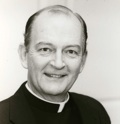 When Fr. Richard John Neuhaus, a priest of the Archdiocese of New York and editor-in-chief of the journal FIRST THINGS, passed away in January, numerous glowing tributes to his life and work poured forth. Appreciation for his contributions emerged from all sectors — leaders from America’s religious, political, and academic communities praised his intellectual work and his pastoral nature. Yesterday, Judge Edith Jones of the U.S. Court of Appeals for the Fifth Circuit delivered a lecture at the University of Minnesota School of Law entitled “The Influence of Richard John Neuhaus on Religion in the Public Square.” Her thoughts, and hopefully those of others as well, will analyze and honor the tremendous impact Fr. Neuhaus had specifically on America’s law and jurisprudence. His 1984 book The Naked Public Square: Religion and Democracy in America coined the phrase that defined the effort by some to drive religious dialogue and values out of America’s public discourse. The book is the starting point for efforts by people of faith to defend moral and religious arguments in public policy discussions (Westlaw finds over 250 uses of the phrase in its journals database).
When Fr. Richard John Neuhaus, a priest of the Archdiocese of New York and editor-in-chief of the journal FIRST THINGS, passed away in January, numerous glowing tributes to his life and work poured forth. Appreciation for his contributions emerged from all sectors — leaders from America’s religious, political, and academic communities praised his intellectual work and his pastoral nature. Yesterday, Judge Edith Jones of the U.S. Court of Appeals for the Fifth Circuit delivered a lecture at the University of Minnesota School of Law entitled “The Influence of Richard John Neuhaus on Religion in the Public Square.” Her thoughts, and hopefully those of others as well, will analyze and honor the tremendous impact Fr. Neuhaus had specifically on America’s law and jurisprudence. His 1984 book The Naked Public Square: Religion and Democracy in America coined the phrase that defined the effort by some to drive religious dialogue and values out of America’s public discourse. The book is the starting point for efforts by people of faith to defend moral and religious arguments in public policy discussions (Westlaw finds over 250 uses of the phrase in its journals database).
In 1996, his journal, FIRST THINGS, published a symposium entitled “The End of Democracy? Judicial Usurpation of Politics”. Contributors included Robert Bork, Chuck Colson, Robert George, and Hadley Arkes. The symposium began with a very straightforward and intentionally shocking question question: “The question here explored, in full awareness of its far-reaching consequences, is whether we have reached or are reaching the point where conscientious citizens can no longer give moral assent to the existing regime.” The editorial introducing the symposium gave a tentative answer as well: “What is happening now is the displacement of a constitutional order by a regime that does not have, will not obtain, and cannot command the consent of the people.” The symposium launched a heated debate about the role of judges in a constitutional republic, and remains a standard reference point in the modern intellectual discussion of “judicial activism.”
Numerous Neuhaus articles in FIRST THINGS, essays in other journals, and speeches also touched on the matters of law and jurisprudence, often as part of a larger discussion of modern liberal democratic politics. Many times the particular context was his opposition to Roe v. Wade – throughout his life, he was a tireless and articulate champion of the right to life. Among his many writings, Neuhaus is the author of several law review articles: “Law and the Rightness of Things,” 14 Val. U. L. Rev. 1 (1979-1980); “Nihilism without the Abyss: Law, Rights, and Transcendent Good,” 5 J. L. & Religion 53 (1987); “The Moral Delegitimization of Law,” 4 Notre Dame J.L. Ethics & Pub. Pol’y 51 (1989-1990); “Contending for the Future: Overcoming the Pfefferian Inversion,” 8 J. L. & Religion 115 (1990); “A New Order of Religious Freedom,” 60 Geo. Wash. L. Rev. 620 (1991-1992); “Rebuilding the Civil Public Square,” 44 Loy. L. Rev. 119 (1998-1999); and “The Persistence of the Catholic Movement,” 52 Catholic U. L. Rev. 269 (2002-2003).
Much more can and will be said about the tremendous life and contributions of Fr. Neuhaus, and some of it will focus specifically on his legal and jurisprudential arguments. For the moment, though, I
associate myself with the words of Ross Douthat from the Atlantic Monthly: “Every young writer, I imagine, has their first intellectual magazine, whose essays and articles are devoured all the more greedily for being slightly over one’s head. Mine was First Things. . . . Month after month, issue after issue, Richard John Neuhaus — through his writing, and also through the writers he cultivated — demonstrated to my adolescent and early-twentysomething self that it was possible to be an intellectually fulfilled Christian.” Amen to that. RIP, RJN.
